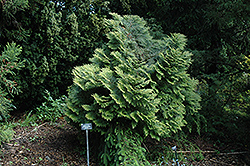It's all about ...
plants

Chinese Incense Cedar
Calocedrus macrolepis
Height: 60 feet
Spread: 20 feet
Sunlight:
![]()
![]()
Hardiness Zone: 5a
Other Names: Incense Cedar
Description:
A wonderfully formal looking evergreen with a very upright and narrow habit of growth, both distinctive and beautiful, adaptable to many conditions but does best in areas of high humidity; use as an exclamation point or for a tall screening wall
Ornamental Features
Chinese Incense Cedar is primarily valued in the landscape for its rigidly columnar form. It has dark green evergreen foliage. The fragrant fan-shaped sprays of foliage remain dark green throughout the winter.
Landscape Attributes
Chinese Incense Cedar is an evergreen tree with a narrowly upright and columnar growth habit. Its average texture blends into the landscape, but can be balanced by one or two finer or coarser trees or shrubs for an effective composition.
This is a relatively low maintenance tree, and is best pruned in late winter once the threat of extreme cold has passed. It has no significant negative characteristics.
Chinese Incense Cedar is recommended for the following landscape applications;
- Vertical Accent
- Hedges/Screening
Planting & Growing
Chinese Incense Cedar will grow to be about 60 feet tall at maturity, with a spread of 20 feet. It has a low canopy with a typical clearance of 2 feet from the ground, and should not be planted underneath power lines. It grows at a slow rate, and under ideal conditions can be expected to live to a ripe old age of 100 years or more; think of this as a heritage tree for future generations!
This tree does best in full sun to partial shade. It is very adaptable to both dry and moist locations, and should do just fine under average home landscape conditions. It is not particular as to soil pH, but grows best in poor soils. It is quite intolerant of urban pollution, therefore inner city or urban streetside plantings are best avoided. This species is not originally from North America.
This plant is not reliably hardy in our region, and certain restrictions may apply; contact the store for more information.
